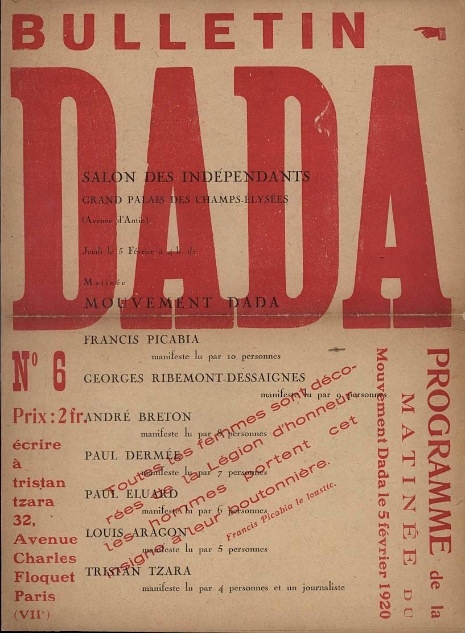
When he was in exile in Zurich in 1916, the Bolshevik leader, Vladimir Ilyich Lenin once visited the DADAist club Cabaret Voltaire. This according to performer and DADAist drummer Richard Hülsenbeck. Lenin was living in an apartment across from the club. He was busy writing his revolutionary plans for a future socialist Russia. The Cabaret Voltaire was founded by Hugo Ball and Emmy Hennings, with the intention of making it a cabaret for radical artistic and political purposes. It was also a focal point for refugees and conscientious objectors, who had fled to Switzerland to avoid fighting in the First World War. According to Ball, from his apartment Lenin would have certainly heard the music and noise that emanated from the cabaret.
Lenin considered himself quite the revolutionary, but what he thought when confronted with the noise and nonsense poems, the shouting and verbal abuse and the endless drumming, is open to conjecture. Was he confounded by DADA? Did he wonder whether this was perhaps how real revolution truly began? Indeed, were these performers more revolutionary than Lenin himself? Or, were they just privileged petty bourgeoisie play-acting at being bad-ass revolutionaries? It is tantalizing proposition to imagine. Lenin certainly did wonder about his revolutionary zeal, as he remarked one night in a conversation with the poet Valeriu Marcu:
”I don’t know how radical you are, or how radical I am. I am certainly not radical enough; that is, one must always be as radical as reality itself.”
DADA was like Punk, but without the Rock. It was subversive, dangerous and revolutionary. European DADA was originally created as a protest movement against war. It was formed by a small group of immigrants from Germany (Hugo Ball, Emmy Hennings, Richard Hülsenbeck), Romania (Marcel Janco, Tristan Tzara), and Austria (Walter Serner). These individuals were politically motivated, and wanted to express an new kind of mentality, a “destructive agitation against everything”:
No more painters, no more writers, no more musicians, no more sculptors, no more religions, no more republicans, no more royalists, no more imperialists, no more anarchists, no more socialists, no more Bolsheviks, no more politicians, no more proletarians, no more democrats, no more armies, no more police, no more nations, no more of these idiocies, no more, no more, NOTHING, NOTHING, NOTHING.
Thus we hope that the novelty which will be the same thing as what we want will come into being less rotten, less immediately GROTESQUE.
DADA may have been a small movement, responding to the “moral bankruptcy” of the day, but its influence has touched upon almost all major artistic and cultural movements of the twentieth century.
Helmut Herbst’s 1968 documentary An Alphabet of German DADAism presents a comprehensive A-Z of the Germans artists and writers who contributed to DADA. Produced and directed by Helmut Herbst, with Hans Richter and Richard Hulsenbeck, featuring sound-artist Kurt Schwitters, satirist George Groz, and artist Max Ernst.
Previously on Dangerous Minds
Kurt Schwitters performs ‘Ursonate’: ‘The Greatest sound poem of the 20th century’